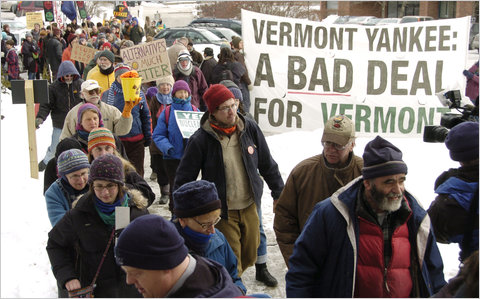A Last-Minute Choice by Texas and Vermont
December 30, 2010
By MATTHEW L. WALD
New York Times

Demonstrators marched in Montpelier last January in support of retiring the Vermont Yankee nuclear power plant. Tearing down the reactor will generate substantial waste.Associated Press Demonstrators marched in Montpelier last January in support of retiring the Vermont Yankee nuclear power plant. Tearing down the reactor will generate substantial waste.
Vermont and Texas, the odd couple of nuclear waste disposal, are proceeding with a plan to allow 36 other states to use a dump site under development in west Texas, despite the misgivings of Vermont’s incoming governor, Peter Shumlin, about the move.
The issue confronts the two states because 16 years ago they formed a "compact" to establish a repository for low-level radioactive waste.
Under federal law, states in a compact can limit a dump site to their own use. But with a dump now being developed in Andrews, Tex., near the New Mexico state line, a commission made up of representatives of the two states has proposed letting in waste from other states.
A public comment period ended on Dec. 26. The commission has scheduled a vote for Jan. 4, two days before Mr. Shumlin is scheduled to take office in Montpelier.
Mr. Shumlin opposes the policy; he has expressed worry that if waste from other states is allowed in, there might not be enough space left for Vermont, especially since he is calling for the shutdown of Vermont’s only nuclear reactor, Vermont Yankee. Tearing it down will generate substantial nuclear waste that will require burial somewhere.
Opponents of the plan say that 5,000 comments have been filed, most of which presumably oppose the move. Proponents argue that the volume of waste produced by Vermont and Texas is so small that costs per cubic foot of waste will be too high. They can lower the cost, they say, by inviting other waste generators, mostly power plants but also hospitals and laboratories, to bury wastes there. Outsiders would pay higher rates.
The proponents add that there is plenty of space for all of Vermont’s waste, even rubble from the reactor.
In Montpelier, David O’Brien, the public service commissioner, who will leave office as Mr. Shumlin is sworn in, said in a telephone interview: "We’re going to take the vote we’re going to take. It’s a logical progression of what we’ve been doing, and we’re not going to reverse field here."
But, he said, if Mr. Shumlin appointed new members to the commission, they could probably reverse the policy later, since many subsequent votes would be needed.
Elizabeth H. Miller, who has been designated by Mr. Shumlin to succeed Mr. O’Brien at the Public Service Commission, said that the governor elect had asked that Vermont’s two delegates on the interstate compact commission sit out the Jan. 4 meeting, but that they would not do so. She agreed with Mr. O’Brien, though, that there would be votes in the future before waste could be imported.
"The incoming administration is going to be very active" on the issue, Ms. Miller said.


